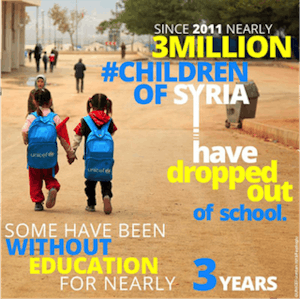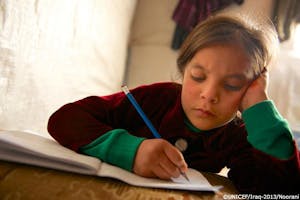Editor’s Note: To find out how you can get involved, read “How You Can Help” at the end of the post.
 Three years of conflict in Syria have devastated children throughout the country. More than 1 million Syrian children now live as refugees in surrounding countries, and more than 4 million children in Syria are living in “dire situations” according to the United Nations Children’s Fund (UNICEF).
Three years of conflict in Syria have devastated children throughout the country. More than 1 million Syrian children now live as refugees in surrounding countries, and more than 4 million children in Syria are living in “dire situations” according to the United Nations Children’s Fund (UNICEF).
I spoke with Justin van Fleet, Chief of Staff to the UN Special Envoy for Global Education Gordon Brown, about the impact of the conflict on education, what UN agencies are doing to respond, and how the world can help Syria’s children.
Jenni Lee: What does this conflict mean for the education of Syria’s children?
Justin van Fleet: Conflict is one of the major barriers keeping children out of school. Over half of the 57 million out-of-school children live in conflict-affected areas.
What this typically means is that their entire education is disrupted – and not just for a year or two. Children and young people can be displaced on average for anywhere from 10-17 years because of conflict. This impacts their entire entire education trajectory – from basic literacy and numeracy through long-term employment and citizenship skills. It has a dramatic impact on their opportunities in life.
If we fail to allow children to continue their education, provide them with a sense of normalcy, and help them develop a set of skills they can use moving forward, we will create a “lost generation,” as many are calling the situation in Syria right now.
Education is not just about reading, writing, and math skills. Education is about hope and opportunity. We must provide education if we want young people to have a positive outlook for the future.
JL: What are the Office of the UN Special Envoy for Global Education and other UN agencies doing to support education for Syria’s refugee children?
JvF: It would be difficult to find any UN agency or organization that is not concerned with education for Syrian refugee children.
Our office is putting a significant focus on education in emergencies and on the Syrian crisis. We’re primarily looking at ways that we can mobilize resources and prioritize education in the humanitarian relief and short-term development agenda to make sure education in emergencies is a reality.
If you look at humanitarian crises, on average, education receives about 1.5% of the overall humanitarian funding. This is nowhere near enough money to deliver education in these settings. If we’re serious about getting every child to school, we have to be serious about funding education in emergencies.
JL: What can the international community do to make sure Syria’s displaced and refugee children get an education? You mentioned finance; are there other things?
JvF: The number one thing we must do is ensure there is significant high political will and priority given to this challenge. We must raise education up on the humanitarian response agenda.
The first piece is, as I mentioned, financing. Donors must prioritize education in their response – and to their great credit, we are seeing more and more donors doing just this. The second part of the equation is working with partners to ensure we have the coordination and delivery systems in place so that when we have financing, we’re able to quickly implement programs on the ground.
Everyone in these emergency situations needs food, water, clothing, and other life-saving interventions. But they also need education, not only because it provides psychosocial support for children who are facing traumatic situations, but also because it provides a sense of hope and opportunity.
Educating Syrian Children in Lebanon: “Education without Borders”
 JvF: Lebanon is the country that has the largest number of Syrian refugee children. The refugee population is largely integrated within the cities, towns, and communities – so they’re not necessarily in refugee camps. This places significant strains on the Lebanese government.
JvF: Lebanon is the country that has the largest number of Syrian refugee children. The refugee population is largely integrated within the cities, towns, and communities – so they’re not necessarily in refugee camps. This places significant strains on the Lebanese government.
We’ve worked with the UN Refugee Agency (UNHCR), UNICEF, and the Lebanese government to develop an education response to provide education for 435,000 Syrian refugee and vulnerable children in Lebanon.
Right now, we have a heavy focus on delivering full financing for that plan, which would require $195.5 million this year. To date, we are approaching $100 million to go toward education in Lebanon this year, and we’re confident we can get the final funding in place.
The plan has several interventions and focuses on a medium-term, three-year response. It requires real partnership between the government of Lebanon, UN agencies, and non-governmental aid organizations, which will deliver different pieces of the program in different communities.
• One tier of the plan is using existing schools and creating first and second shifts so we can allow the schools to have increased capacity.
• Another pillar uses existing infrastructure in community centers to provide accelerated learning programs for children and other literacy and basic skill development programs.
• We’re also looking at using community centers for early childhood programs and programs that are more targeted toward life skills for the older youth population in the 15-18 year old bracket.
The goal is “Education without Borders,” or demonstrating for the first time that it’s possible to provide a full education response in emergencies – the same way that Medicines Sans Frontieres established the principle that it is possible to provide health care in emergencies.
If we can demonstrate it is possible in Lebanon, we can continue to inspire the international community to prioritize education in emergency situations – whether in the neighboring countries related to the Syrian crisis or other crises around the world. It should no longer be a question of will there be education in a conflict setting; we hope it will be a matter of how quickly education will be up and running because we know it is not only important, but possible.
How You Can Help
“One of the major things people can do is contribute to make sure we have enough resources to deliver education,” said van Fleet.
Here are a few organizations he recommends:
• The UN Children’s Fund
• The UN Refugee Agency
• Avaaz
• Western Union’s Education for Better Fund
“The public needs to continue to raise awareness. Everyone should see what their government is doing to prioritization and fund education in emergencies – and if they are not taking a leadership role, I would encourage people to put pressure on governments to do more and to do better,” said van Fleet.



 View All Blog Posts
View All Blog Posts